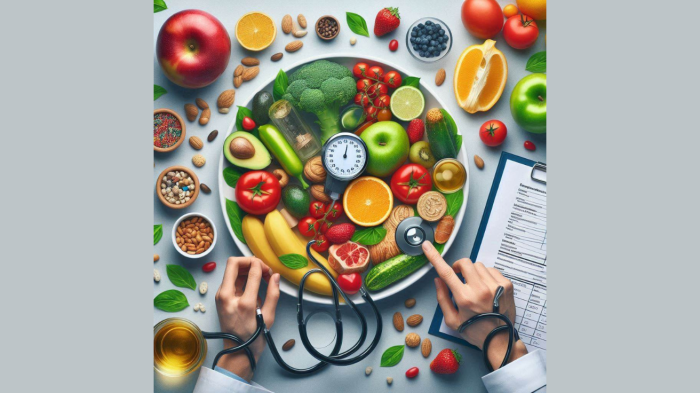Healthy Eating for Blood Pressure Control
High blood pressure, or hypertension, can be effectively managed through lifestyle changes, especially dietary adjustments. Following a balanced eating plan not only helps in lowering blood pressure but also supports overall heart health. One of the most recommended diets for managing blood pressure is the DASH diet, which emphasizes whole foods and balanced nutrients.
The DASH Diet and Its Benefits
The Dietary Approaches to Stop Hypertension (DASH) diet is specifically designed to help people control blood pressure. Studies have shown that the DASH diet can lower blood pressure in as little as two weeks, making it an effective approach for those with hypertension or anyone aiming to reduce their risk.
The DASH diet focuses on reducing sodium intake and promoting foods rich in nutrients like potassium, calcium, and magnesium. These nutrients play a role in lowering blood pressure by helping blood vessels relax, balancing fluids, and supporting heart health.
The DASH diet is beneficial not only for blood pressure but also for cholesterol levels, insulin sensitivity, and weight management, all of which are important for cardiovascular health.
Foods to Include and Avoid
Incorporating the right foods can make a significant difference in managing blood pressure. Here’s a breakdown of what to include and what to avoid:
Foods to Include:
- Fruits and Vegetables: These are high in potassium, fiber, and other essential vitamins. Leafy greens, berries, bananas, and oranges are especially beneficial.
- Whole Grains: Choose whole-grain bread, brown rice, oats, and quinoa. Whole grains provide fiber and help keep blood pressure stable.
- Low-Fat Dairy: Options like low-fat yogurt, milk, and cheese offer calcium, which can help in reducing blood pressure.
- Lean Proteins: Include fish, poultry, and plant-based proteins like beans and lentils. Fish high in omega-3 fatty acids, such as salmon, can also help lower blood pressure.
- Nuts and Seeds: Almonds, flaxseeds, and chia seeds are great sources of healthy fats and can support heart health.
- Healthy Fats: Olive oil, avocados, and nuts contain monounsaturated fats, which are beneficial for blood pressure control.
Foods to Avoid:
- Processed Foods: Foods like chips, instant noodles, and canned soups often contain high levels of sodium, which can raise blood pressure.
- Sugary Snacks: Excess sugar intake can lead to weight gain, which can, in turn, elevate blood pressure. Limit sweets, sugary drinks, and desserts.
- Red and Processed Meats: These are high in saturated fats and sodium, so limit or avoid items like bacon, sausages, and hot dogs.
- High-Sodium Condiments: Items like soy sauce, ketchup, and salad dressings can be high in sodium. Look for low-sodium versions or make your own.
- Alcohol: Excessive alcohol intake can contribute to high blood pressure. If you drink, do so in moderation.
Practical Tips for Healthy Eating
Adopting healthier eating habits for blood pressure control doesn’t have to be overwhelming. Here are some practical tips to make it easier:
- Plan Your Meals: Meal planning helps in making healthier choices. Prepare balanced meals for the week, which can reduce the temptation to opt for processed foods.
- Check Food Labels: Look at the sodium content in packaged foods. Aim for products that have less than 140 mg of sodium per serving.
- Use Herbs and Spices: Flavor your food with herbs and spices instead of salt. Garlic, basil, oregano, and turmeric can add flavor while offering health benefits.
- Snack on Fruits and Vegetables: Keep fruits, vegetables, or unsalted nuts as snacks to stay full and avoid processed options.
- Drink Plenty of Water: Staying hydrated helps the heart pump blood more easily and can support overall cardiovascular health.
Maintaining a balanced diet like DASH can help reduce the risk of high blood pressure and support a healthy heart. With small, consistent changes, dietary adjustments can become second nature.
For additional support, Chatdok’s medical chatbot provides personalized tips, reminders, and information tailored to help you manage your blood pressure effectively. With guidance available at your fingertips, making healthy eating choices can be simpler and more achievable.
Conclusion
Healthy eating plays a significant role in controlling blood pressure and improving cardiovascular health. By adopting dietary practices like the DASH diet, focusing on nutrient-dense foods, and avoiding high-sodium, high-sugar foods, it’s possible to make a positive impact on blood pressure. Taking these steps can help you manage blood pressure more effectively and support long-term health.



